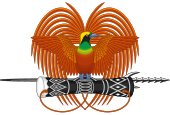1982 Papua New Guinean general election
 |
|---|
|
General elections were held in Papua New Guinea between 5 and 6 June 1982.[1] The result was a victory for the Pangu Party, which won 51 of the 109 seats. Voter turnout was 52%.
Campaign[]
A total of 1,125 candidates contested the election,[2] of which seventeen were women. Only one, Nahau Rooney, was elected. She had been standing for re-election, as had MPs Waliyato Clowes and Josephine Abaijah, who both lost their seats.[3]
Results[]
Following the elections, several elected MPs changed their party affiliation; the Pangu Party gained ten MPs to hold 61 seats and the National Party gained six MPs to hold 19. The People's Progress Party lost a seat, while the Melanesian Alliance lost two and the United Party lost three. All members of the Diro Independents Group left to join other parties, with no MPs left sitting as independents.[4]
| Party | Votes | % | Seats | +/– | |
|---|---|---|---|---|---|
| Pangu Party | 34.0 | 51 | +21 | ||
| National Party | 10.0 | 13 | +11 | ||
| People's Progress Party | 10.0 | 14 | –2 | ||
| United Party | 7.2 | 9 | –15 | ||
| Melanesian Alliance Party | 8.6 | 8 | New | ||
| 6.9 | 7 | New | |||
| Papua Besena | 1.6 | 3 | –2 | ||
| 0.8 | 0 | New | |||
| Independents | 20.9 | 4 | –23 | ||
| Invalid/blank votes | 43,694 | – | – | – | |
| Total | 2,412,810 | 100 | 109 | 0 | |
| Votes cast | 1,194,114 | – | |||
| Registered voters/turnout | 2,309,621 | 51.7 | |||
| Source: IPU, Nohlen et al. | |||||
Aftermath[]
When the newly elected National Parliament met, Michael Somare was elected Prime Minister, defeating John Momis 66–40. Dennis Young was elected Speaker.[5]
| Position | Member |
|---|---|
| Prime Minister | Michael Somare |
| Deputy Prime Minister Minister of National Planning and Development Minister of Primary Industry |
Paias Wingti |
| Minister of Commerce and Industry | |
| Minister of Correctional Services | |
| Minister of Culture and Tourism | |
| Minister of Decentralisation | |
| Minister of Defence | |
| Minister of Education | Barry Holloway |
| Minister of Environment and Conservation | |
| Minister of Finance | |
| Minister of Foreign Relations and Trade | |
| Minister of Forests | |
| Minister of Health | |
| Minister of Home Affairs | |
| Minister of Justice | |
| Minister of Labour and Employment | |
| Minister of Land | |
| Minister of Media | |
| Minister of Minerals and Energy | |
| Minister of Parliamentary Services | |
| Minister of Police | John Giheno |
| Minister of Public Services | |
| Minister of Public Utilities | |
| Minister of Religion, Youth and Recreation | |
| Minister of Transport and Civil Aviation | |
| Minister of Urban Development | |
| Minister of Works and Supply |
References[]
- ^ Dieter Nohlen, Florian Grotz & Christof Hartmann (2001) Elections in Asia: A data handbook, Volume II, p770 ISBN 0-19-924959-8
- ^ Papua New Guinea IPU
- ^ Sepoe, Orovu, "To make a difference: Realities of women’s participation in Papua New Guinea politics", Development Bulletin, no. 59, 2002, p.40. (Electronic version Archived 2009-09-13 at the Wayback Machine)
- ^ Nohlen et al., p774
- ^ "The Chief" regains his leadership after a bitter PNG campaign Pacific Islands Monthly, September 1982, pp15–17
- Elections in Papua New Guinea
- 1982 elections in Oceania
- 1982 in Papua New Guinea
- National Parliament of Papua New Guinea